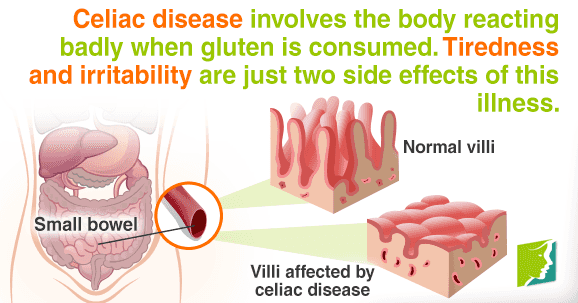Fatigue can be mild to serious, and even develop into chronic fatigue syndrome (CFS), a persistent exhaustion that does not go away. The symptoms can include heavy eyelids, lack of motivation, irritability, and difficulty concentrating. Anybody can develop fatigue, but chronic fatigue is more prevalent among women than men, and normally sets in between the ages of 20 - 45. The causes for fatigue are numerous, and can include medical conditions. Although CFS is not always caused by a specific underlying condition, it's often an indicator of one. Keep reading to discover some of the possible medical reasons for CFS.
Celiac Disease
This autoimmune condition causes the body to react badly when gluten - an enzyme found in wheat, barley or soy - is consumed. Celiac disease is not a straightforward allergy to the offending substance, but rather one that causes the body to mistakenly attack healthy gut tissue. Unfortunately, this can affect the bowel and prevent the proper absorption of many essential nutrients. Tiredness and irritability are just two side effects of this illness.
Iron Deficiency
Lack of iron is one of the most common causes of persistent fatigue. This is because a shortage of iron leads to insufficient red blood cell production, and as a consequence, less oxygen is transported around the body. A typical sign of iron deficiency anemia is a lack of motivation to do things, and a sensation of “heaviness” in the muscles.
Underactive Thyroid
The thyroid gland is situated near the throat and is part of the endocrine system. It produces three different thyroid hormones, which control mainly metabolic and growth functions. If not enough of any of these essential hormones are being produced, then one of the main centers for energy regulation, the metabolism, is not functioning properly. Thus, fatigue ensues.
Diabetes
Diabetes is a disease whereby the blood sugar is too high because the body is not producing sufficient amounts of insulin. The problems with insulin production renders the body unable to break down glucose into energy. Therefore, one of the warning signs of this condition is a feeling of chronic exhaustion.
Mononucleosis
Most common in teenagers and young adults, Epstein-Barr viral infections - also called infectious mononucleosis or glandular fever - are normally easily treatable. However, they can be unpleasant, and symptoms may be felt for a few weeks. The infection generally leads to a high temperature, a sore throat, swollen glands in the neck, and overwhelming tiredness. The tiredness can persist for a long time after the fever is gone.
This is by no means an exhaustive list, and there are various other medical reasons that can trigger fatigue, as well as an extensive list of non-medical reasons. Fatigue can be an indication of an underlying condition that needs immediate medical attention, so it must never be ignored.
Follow the link below for more information on how to manage fatigue.
Sources
- National Health Service UK. (2013). 10 medical reasons for feeling tired. Retrieved September 5, 2014, from http://www.nhs.uk/Livewell/tiredness-and-fatigue/Pages/medical-causes-of-tiredness.aspx
- National Health Service UK. (2013). Chronic fatigue syndrome - Treatment. Retrieved September 5, 2014, from http://www.nhs.uk/Conditions/Chronic-fatigue-syndrome/Pages/Treatment.aspx
- National Health Service UK. (2014). Coeliac disease. Retrieved September 5, 2014, from http://www.nhs.uk/conditions/Coeliac-disease/Pages/Introduction.aspx
- National Health Service UK. (2014). Diabetes. Retrieved September 5, 2014, from http://www.nhs.uk/Conditions/Diabetes/Pages/Diabetes.aspx
- National Health Service UK. (2012). Glandular fever. Retrieved September 5, 2014, from http://www.nhs.uk/conditions/Glandular-fever/Pages/Introduction.aspx
- National Health Service UK. (2014). Iron deficiency anaemia. Retrieved September 5, 2014, from http://www.nhs.uk/conditions/Anaemia-iron-deficiency-/Pages/Introduction.aspx
- National Endocrine and Metabolic Diseases Information Service. (2013). Hypothyroidism. Retrieved September 5, 2014, from http://www.endocrine.niddk.nih.gov/pubs/hypothyroidism/




